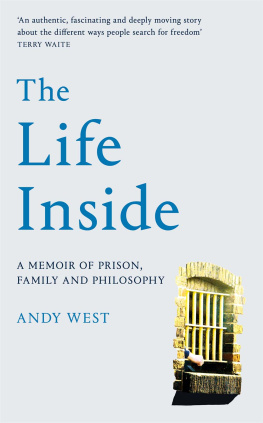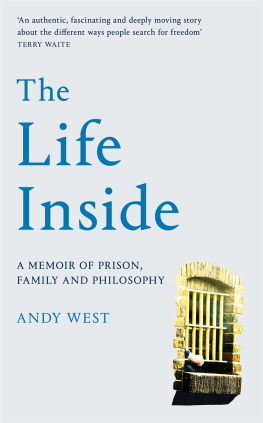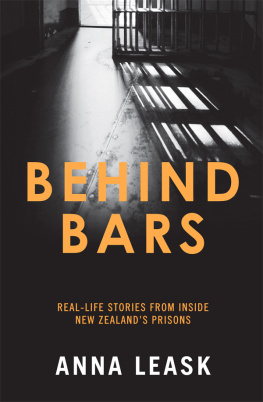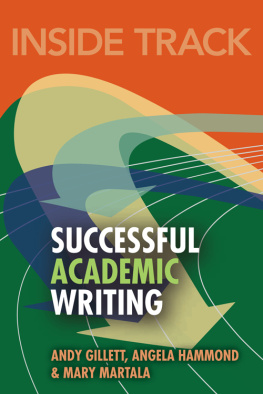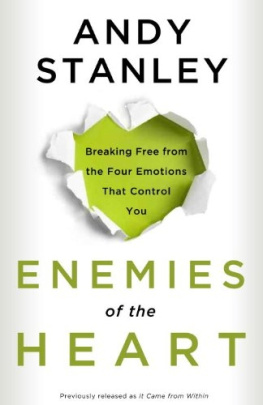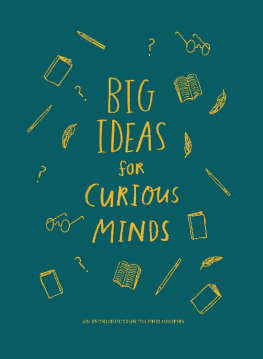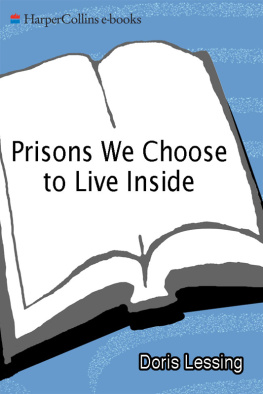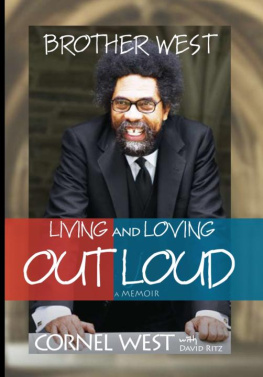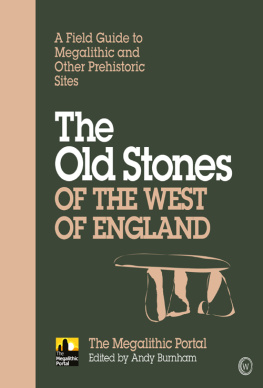ANDY WEST
The Life Inside
A Memoir of Prison, Family and Philosophy

For my brother
Ideas are substitutes for griefs
M ARCEL P ROUST
By my guilt I further gained the right to intelligence
J EAN G ENET
Authors Note
Names and details of people, places and events have been changed or merged. Events have also been moved around in time. I have done this to protect privacy, maintain sensitivity towards victims, avoid compromising both prison and personal security and narrativize my experiences into a personal story. There is no such thing as the prison or the prisoner. There are a multitude of prisons and each person in prison has their own experience. Whilst this book aims to capture something of that plurality, it is foremost written from my subjective viewpoint as someone who had family in prison and now teaches inside. Classroom dialogues are drawn from a period of four years; Ive tried to render the essence of the conversations, even when I wasnt able to recall what was said word for word. I have written my personal experiences as I remember them, and where possible I have done research or conferred with others to check the truthfulness of my memories. However, some may recollect things differently.
My students in prison are not allowed access to social media; they cannot publish anything in public without the Ministry of Justices permission and many of them have difficulties writing. A lot of them live with a social stigma, which often means their voices are not heard or that they may not wish to talk about their experience if that means outing themselves as a prisoner or ex-prisoner. As I worked on this book, I was aware that I was writing about people who often dont have the chance to write about themselves. Everyone has stories to tell but only some are afforded the privilege to share stories with a larger audience. I have tried to remain mindful of the responsibility that comes with the opportunity that has been given to me. Where necessary, I have consulted ex-prisoners, colleagues and academics to check my understanding.
Thank you to my relatives who have entrusted me with telling their stories. I hope I have succeeded in writing about them with honesty and care.
Contents
Identity
Justice: to be ever ready to admit that another person is something quite different from what we read when he is there.
S IMONE W EIL
The man standing next to me inside the lift looks uncannily like my father, who I have not seen for twenty years, since he was sent to prison. He is short, has yellowed fingertips and the sleeves of his oversized suit jacket brush his knuckles. I have seen men who look like my father before, while I was on buses and trains or standing at urinals in pub toilets. Ive seen them in London, Manchester, Berlin and Rio de Janeiro.
In the lift, I glance at him and I recognize the permanently clenched jaw, the emphysemic wheeze in the breathing. I pull my shirtsleeve over my wrist to conceal my watch and ask him for the time. He doesnt answer with a Scouse accent and therefore hes not my dad. Neither were the men in Germany or Brazil. We travel up another five floors in silence. The lift stops, the doors open and he exits.
Tomorrow morning Ill be going into a prison for the first time. Ill be teaching philosophy to men. A few months ago, I wrote a piece in the Guardian about teaching philosophy, where I mentioned that my dad, brother and uncle did time inside. Last month, a philosopher called Jamie from a local university asked me to co-teach in jail. I assume I have been invited to work on the project because Ill be a good fit culturally, because I might understand convict logic in a way that most Tractatus-clutching types wouldnt. Since Jamie asked me to work with them, Ive been noticing a pair of heavy ankle-length black boots in a shop window. Its spring and I am in the habit of wearing soft leather Oxford shoes with stonewashed jeans twice rolled up at the bottom. This afternoon I went into the shop. They only had the boots in a size ten. Im a size nine, but that doesnt matter to me so I bought them.
The next morning in prison, Jamie and I have set the chairs up in a circle and wait for our students. The classroom doubles as an art room. Its like the art classrooms from my schooldays except there are bars on the windows, and the pencils and paintbrushes and anything else with a pointed end are kept in padlocked cupboards.
I look over the pages of our lesson plan on Lockes theory of identity. I imagine my dad trying to make sense of it, and with a pen I strike red lines through entire paragraphs. Keep it accessible, I say to Jamie. Theres going to be a lot of illiterate guys, men who didnt finish school. Dont overwhelm them. I hear the clanking of heavy metal doors being opened and the echoing voices of men talking in the corridor outside. Our students are approaching. Im wearing my new boots; the unworn toecaps have a first-day-at-school shininess.
A man comes to the door. Is this psychology? He has morning breath and bloodshot eyes.
Philosophy, I say.
He shrugs, walks in and takes a seat.
Another man comes in, gives me a bone-crushing handshake and looks past my shoulder. Another with sallow skin and receding gums. A man clutching a plastic bag with Leeds University printed on it; the bag is split at the seam but he still carries his library books in it. A man with a round face who looks skeletal in the photo of his ID card. I walk around the group introducing myself but wince at a pain in my feet. My boots are rubbing my skin. I feel the sting of fresh blisters on my heels. More men arrive until there are twelve. Jamie and I take a last look through our notes for todays class. Accessible, I say again.
The men sit in a circle and I explain Locke.
Thats not quite right, says a student called Macca.
Excuse me, I say.
Locke didnt only care about memory. He points at my whiteboard. It was more consciousness.
All twelve men are looking at me. I walk over to the whiteboard, tiptoeing to avoid the shooting pain on my heels, wipe out the word memory and write consciousness. The men laugh and whisper to each other. I try to explain Locke again, moving only in small strides, careful not to land my whole foot on the floor. A few minutes later, another student, who has just finished a distance learning degree, explains how Rousseau might disagree with Locke. Twenty minutes in we have run out of material. From across the room, Jamies eyes meet mine and the word accessible silently rings out between us.
Jamie sets the students some work in small groups and suggests we go over to the desk in the corner of the room to confer. Jamie goes to the desk and I tiptoe behind.
Freedom
Part of you may live alone inside,
like a stone at the bottom of a well.
But the other part
must be so caught up
in the flurry of the world
that you shiver there inside
when outside, at forty days distance, a leaf moves.
N ZIM H IKMET
A few months on, I now wear the same soft leather Oxford shoes to prison every week that I wear most other days. Ive just returned from three weeks travelling solo in Thailand. My skin has bronzed and my hair is caramel brown. I walk through the strip-lit corridors of the prison to my classroom. A man escorted by guards passes me from the opposite direction. He has a pallid forehead and flaking skin underneath his eyes. I roll down the sleeves of my shirt to hide my suntan. I get to the classroom and write the theme for todays lesson on the board: Freedom.

